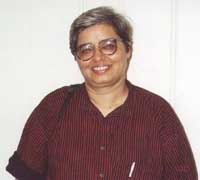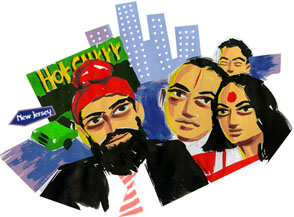Even a couple of years ago, the municipal water supply through restricted was still reasonably adequate. Water was provided for two hours in the morning and another two years in the evening, and if this water was judiciously used and stored in over head tanks, then well…. one could survive. Then the supply started to slowly decline. The first to go was the evening supply….. The duration started reducing slowly over time and finally a day came when it stopped altogether. However it never became permanent phenomena – on the odd evening, water would still be supplied – but when and for how long, no one knew and it became impossible to depend on that evening supply. Then the morning supply started getting affected in a similar way and earlier this summer, one fine morning, the water simply ran dry. If at on the odd day, some trickle of water was supplied, there happened to be a power cut on at the very hour and so it proved impossible to pump anything up into the storage tanks. Though the municipal water limped back to its nominal morning trickle (about 20 minutes), it was then that our land lady gave in and drilled a bore well much against her wishes. The few days that the taps were completely dry, the government sent in some tankers but the ordeal of carting buckets up the steep stair cases pretty much broke our backs. However the bore well was pretty much in line with what her neighbors had done years ago. Blessed with a gush of fresh water at the end of a switch has lulled my neighbors into believing that fresh water from the ground was like some never ending fount of spring.
 Over summer I have been seeing what this delusion can lead to. Amidst some what desperate advertisements in the newspapers preaching about water conservation and rain water harvesting are some of the most grotesque uses of the scarce commodity that water has become.
Over summer I have been seeing what this delusion can lead to. Amidst some what desperate advertisements in the newspapers preaching about water conservation and rain water harvesting are some of the most grotesque uses of the scarce commodity that water has become.On my way to office every morning, I pass a three storied house. Like most areas in Delhi, houses have not been built to accommodate any car parking, so the residents dump their many cars on the street. Every morning as I pass by, one of these cars is being washed. And though there are many advertisements suggesting that perhaps people could wash their cars with buckets of water and conserve some few listen. In this particular instance, a huge hose pipe dangles from some unseen tap on the third floor, and as it swings this way and that with water gushing, the driver tries to maneuver the pipe over various parts of the car’s portly body. And while the driver is busy with his rag and scrubs, the water spurts on to the road making puddles. Every one is oblivious and although the sight makes me cringe, there seems little that I too can do. The imagery I see every morning makes me believe that Shekar Kapur’s film “Water” is one whose time has very much come.
Shekar’s next film, Paani, is set in 2025 in a city polarized by water scarcity, a world divided into the haves and have-nots - those who have water and those who don’t. Shekhar said in an interview that “Paani is not just about water shortage. It’s about the callousness of world where about three per cent of the populace are haves; the rest are have-nots. And what a wonderful way to speak of that disparity through the one resource that we’re most squandering away,”
I think that Shekar Kapur’s point is well taken – I would argue only one point. Shekhar does not need to date the film in 2025 as if the problem of water scarcity is one of the futures. He can set his film in the here and now. Ask me.
















